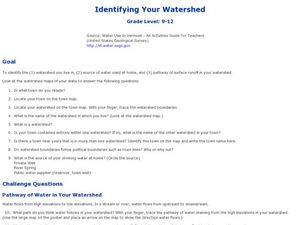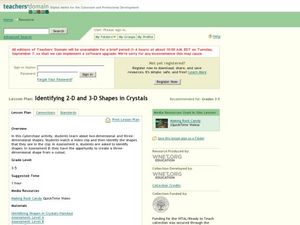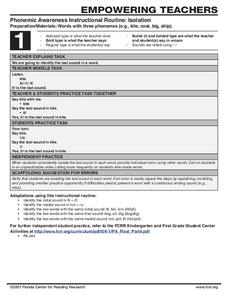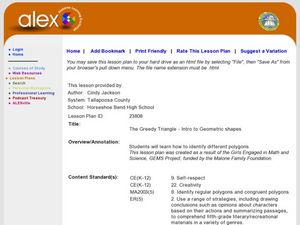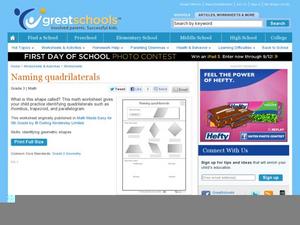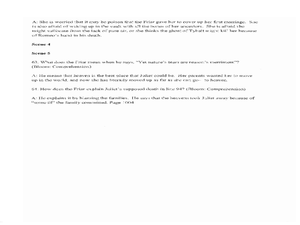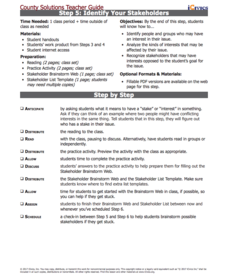Curated OER
Identify Intended Media Messages
How does media convey different messages? Use this lesson to explore media by identifying and analyzing selected images. Middle schoolers analyze a poster and discuss the intended meaning of the imagery and how it makes them feel. They...
Curated OER
Identifying Your Watershed
Students identify the watershed where they live and how it is related to their own water consumption. In this watershed lesson students locate their watershed on their town map. The students find the source of their water that they use...
Curated OER
Identifying 2-D and 3-D Shapes in Crystals
Learners view a video on making rock candy and identify the shapes they see while watching. In this 2 and 3 dimensional shape instructional activity, students recognize shapes and complete worksheets to identify them. Learners build...
Curated OER
Identifying Figurative Language #1
In this identifying types of figurative language worksheet, students read sentences and phrases, determine if they are similes, metaphors, hyperboles, personifications, or a combination, identify the type/s and write an explanation of...
Curated OER
Identifying Text Structure #!
In this identifying graphic organizers and their texts worksheet, students observe chronological, compare & contrast, sequence, cause & effect, and problem & solution graphic organizers, read short passages, and match them....
Curated OER
Identify the Angles
In this geometry worksheet, students identify angles using a word bank. They differentiate between obtuse, acute or right angle.
Curated OER
Identify Time Signatures - 2
In this identify time signatures worksheet, student determine the correct meter signature for each of 8 lines of music when they identify the correct answers by circling them.
Curated OER
Identifying Prepositions: Kick One Out!
Do your middle schoolers need extra practice identifying prepositions? Learners are presented with a series of words and asked to eliminate the word that is not a preposition. An answer key is provided.
Curated OER
Phonemic Awareness Instructional Routine: Isolation
This phonemic awareness activity would be great for morning meeting or circle time. Teacher calls out a word, s/he identifies the final phoneme. The class then take turns saying other simple or cvc words that also have the same ending...
Curated OER
The Seeds We Need
Learners apply word analysis skills to recognize new words, identify genres of fiction and nonfiction, and identify important themes and topics. They explore differences in plants, flowers, and vegetables. A book bag full of activities...
Curated OER
The Greedy Triangle-Intro to Geometric Shapes
In this geometry lesson, learners read The Greedy Triangle and use geoboards to construct geometric shapes. They identify the number of sides and angles each shape has.
Curated OER
What Can I Do?
Here is a good way for children to identify ways to handle conflict. They discuss the connection between feelings and conflict. Everyone listens to a story about a conflict between two friends and they discuss what they could have done...
Curated OER
Patterns in Pascal's Triangle
Learners examine the patterns in Pascal's Triangle. In this recognizing instructional activity, students view a model of Pascal's Triangle and describe the patterns of the multiples. Learners identify the shapes that are made within...
Curated OER
Career & Technical Education: Grade 7
Educate your learners on the importance of using bio-diesel as an alternative transportation fuel. Provided here are several links to books (with reviews), a 24-page informational text in three reading levels, a corn activity, and...
Curated OER
Naming Quadrilaterals
Scholars examine six common quadrilaterals and identify each by writing its name beneath the shape. Next, they sketch four shapes: parallelogram, rectangle, rhombus, and trapezoid. Once finished, review which features helped...
Curated OER
Naming 2-Dimensional Shapes
Inside each of these two-dimensional shapes, scholars identify the figure by writing its name. There is a word bank for them to work from, but some shape names are used multiple times. There are six identifiers they use: pentagon,...
Clever Student Training Company
Analyzing the Essay
The skill set required of readers of informational text includes the ability to identify an article’s thesis or main idea, as well as the supporting points. Learners can practice these skills by analyzing an essay about the treatment of...
CK-12 Foundation
Identify Line Types: Identify Types of Lines
If lines aren't parallel or perpendicular, then what are they? An interactive lets users rotate a line to change its orientation
with respect to another line. It then indicates whether the
lines are parallel, perpendicular, or...
Curated OER
Irony in "The Gift of the Magi"
Use O. Henry's ubiquitous tale of love and poverty to explore irony. After reading the story, middle schoolers identify examples of all three kinds of irony in the story. With partners, they brainstorm original examples of irony. Then...
Curated OER
Boys Will Be Boys...Right?
Through this exercise, high schoolers identify character traits present in Romeo and Juliet. They listen to an excerpt from "The Office of Christian Parents: Showing How Children Are to be Governed" and participate in a Socratic...
Curated OER
Match the Pictures
Which of these objects are the same? Get your pre-readers comfortable with identifying objects that are identical, focusing on the term same. They examine eight pictures, drawing a line between those that are the same. The objects should...
Curated OER
Triangles
Why are there so many different types of triangles? Be that as it may, beginning geometers need to understand the differences between equilateral, isosceles, scalene, and right triangles, and they get a visual approach with this...
iCivics
Step 5: Identify Your Stakeholders
Have you ever had a goal, but needed help achieving it? Scholars analyze the purpose of stakeholders in the fifth installment of a 10-part County Solutions - High School series. They investigate finances, personal concerns, geography,...
EngageNY
Discussing and Identifying Themes: What Makes a Good Children’s Book?
Working in small groups, scholars look closely at a children's book to evaluate narrative techniques. Next, they complete a Children's Book Scavenger Hunt worksheet to analyze the literary elements of their selected stories.
Other popular searches
- Identifying Context Clues
- Identifying the Main Idea
- Identifying Main Ideas
- Identifying Parts of Speech
- Identifying Nouns
- Identifying Point of View
- Identifying Topic Sentences
- Identifying Mood
- Identifying Parts of Plants
- Identifying Author's Purpose
- Identifying Authors Purpose
- Identifying Emotions



